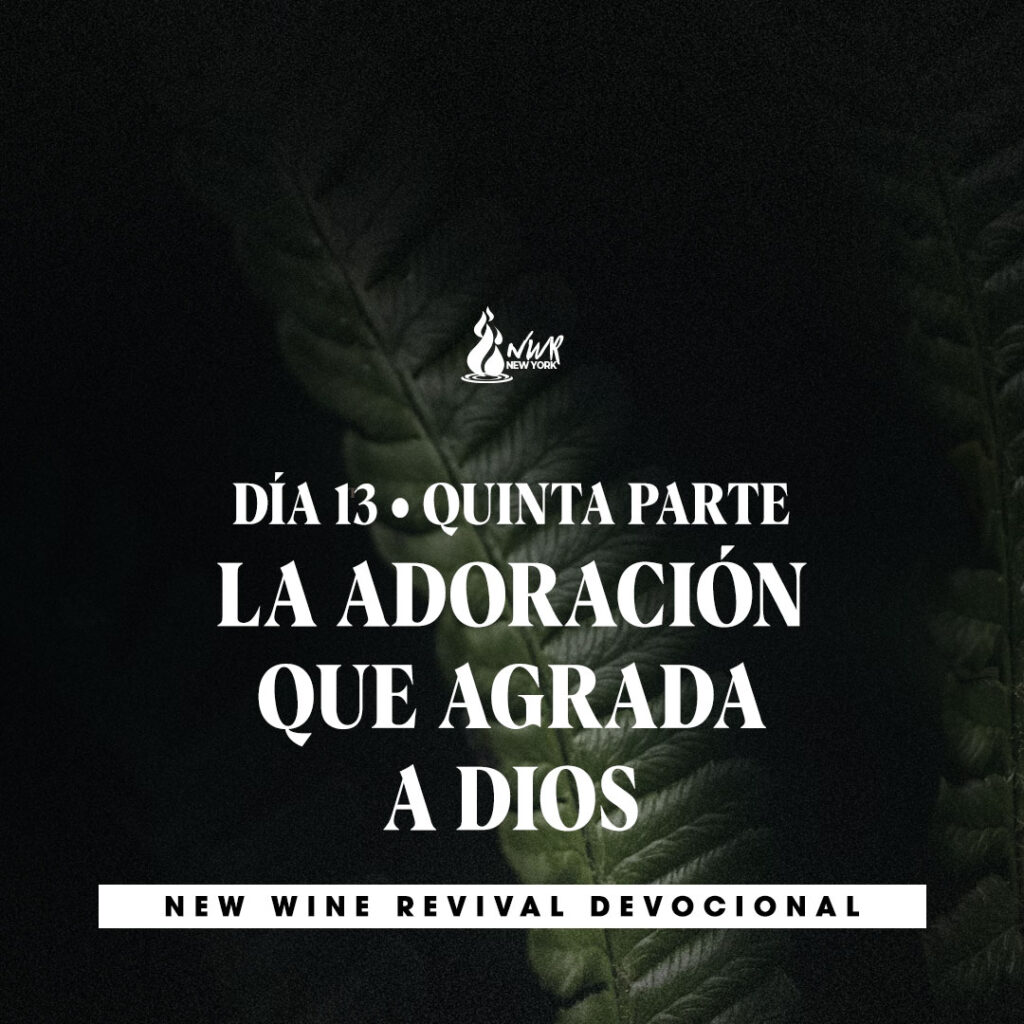
No voy a ofrecer al Señor mi Dios holocaustos que nada me cuesten.
2 SAMUEL 24:24 (PAR)
A Dios le agrada la adoración práctica. La Palabra de Dios afirma: «Les ruego que cada uno de ustedes, en adoración espiritual, ofrezca su cuerpo como sacrificio vivo, santo y agradable a Dios».11 ¿Por qué quiere Dios tu cuerpo? ¿Por qué no dice «ofrezcan su espíritu»? Porque sin el cuerpo no podemos hacer nada en este planeta. En la eternidad recibiremos un cuerpo nuevo, mejorado, actualizado, pero mientras estemos sobre la tierra, Dios dice: «¡Dame lo que tengas!». Él únicamente está siendo práctico con respecto a la adoración. ¿Has escuchado decir a las personas: «Esta noche no puedo ir a la reunión, pero estaré con ustedes en espíritu»? ¿Saben lo que significa esto? Nada. ¡No vale nada! Mientras estemos en esta tierra, nuestro espíritu solo puede estar donde esté nuestro cuerpo. Si tu cuerpo no está presente, no estás ahí. Cuando adoramos debemos ofrecer nuestro «cuerpo como sacrificio vivo». En la actualidad asociamos el concepto de «sacrificio» con algo muerto, pero Dios quiere que seamos un sacrificio vivo. ¡Quiere que vivamos para él! Sin embargo, el problema de un sacrificio vivo es que se puede escapar del altar, y es lo que solemos hacer. Cantamos: «¡Firmes y adelante!, huestes de la fe» los domingos, y los lunes desertamos. La verdadera adoración se arraiga en la Palabra. En el Antiguo Testamento, a Dios le agradaban los sacrificios de adoración porque anunciaban el sacrificio de Jesús por nosotros en la cruz. Ahora bien, a Dios le agradan diferentes tipos de sacrificio de adoración: la gratitud, la alabanza, la humildad, el arrepentimiento, las ofrendas de dinero, la oración, el servicio a los demás y el compartir los recursos con los necesitados.12 La verdadera adoración tiene un precio. David lo sabía y dijo: «No voy a ofrecer al SEÑOR mi Dios holocaustos que nada me cuesten».13 La adoración sacrifica nuestro egocentrismo. No podemos exaltar a Dios y exaltarnos al mismo tiempo. No podemos adorar para impresionar a los demás y agradarnos a nosotros mismos. Necesitamos retirar deliberadamente el enfoque de nuestra persona. Cuando Jesús dijo: «Ama a Dios con todas tus fuerzas», quería señalar que la adoración requiere esfuerzo y energía. No es siempre ni lo más conveniente ni lo más cómodo, y en ocasiones la adoración es un acto de la voluntad absoluto: un sacrificio de buena voluntad. La adoración pasiva es una incongruencia. Ofrecemos sacrificio de adoración a Dios cuando lo alabamos aunque no tengamos ganas, cuando nos levantamos de la cama para adorarle aunque estemos cansados, y cuando ayudamos a los demás aunque estemos agotados. Eso agrada a Dios. Matt Redman, un líder inglés de adoración, cuenta cómo su pastor le enseñó a la iglesia el verdadero significado de la adoración. Para mostrarles que esta era más que la música, prohibió por un tiempo el canto en los servicios, mientras aprendían otras maneras de adorar. Al cabo de ese tiempo, Matt había escrito el himno clásico El corazón de la adoración: Te traigo más que una canción, porque ella en sí no es lo que me pides. Buscas más adentro que lo que a simple vista parece: miras dentro de mi corazón.14 El corazón de este asunto es un asunto del corazón.
DÍA 13
Pensando en mi propósito
PUNTO DE REFLEXIÓN: Dios quiere todo de mí.
VERSÍCULO PARA RECORDAR: «Ama al Señor tu Dios con todo tu corazón, con toda tu alma, con toda tu mente y con todas tus fuerzas». Marcos 12:30 (NVI).
PREGUNTA PARA CONSIDERAR:¿Qué le agrada más a Dios en este momento: mi adoración en público o en privado? ¿Qué haré al respecto?
DAY 13/Fifth part • Worship That Pleases God
I will not offer to the LORD my God sacrifices that have cost me nothing.
2 SAMUEL 24:24 (TEV)
God is pleased when our worship is practical. The Bible says, “Offer your bodies as living sacrifices, holy and pleasing to God — this is your spiritual act of worship.” Why does God want your body? Why doesn’t he say, “Offer your spirit”? Because without your body you can’t do anything on this planet. In eternity you will receive a new, improved, upgraded body, but while you’re here on earth, God says, “Give me what you’ve got!” He’s just being practical about worship.
You have heard people say, “I can’t make it to the meeting tonight, but I’ll be with you in spirit.” Do you know what that means? Nothing. It’s worthless! As long as you’re on earth, your spirit can only be where your body is. If your body isn’t there, neither are you.
In worship we are to “offer our bodies as living sacrifices.” Now, we usually associate the concept of “sacrifice” with something dead, but God wants you to be a living sacrifice. He wants you to live for him! However, the problem with a living sacrifice is that it can crawl off the altar, and we often do that. We sing, “Onward, Christian Soldiers” on Sunday, then go AWOL on Monday.
Real worship is rooted in the Word.
In the Old Testament, God took pleasure in the many sacrifices of worship because they foretold of Jesus’ sacrifice for us on the cross. Now God is pleased with different sacrifices of worship: thanksgiving, praise, humility, repentance, offerings of money, prayer, serving others, and sharing with those in need.
Real worship costs. David knew this and said: “I will not offer to the LORD my God sacrifices that have cost me nothing.” One thing worship costs us is our self-centeredness. You cannot exalt God and yourself at the same time. You don’t worship to be seen by others or to please yourself. You deliberately shift the focus from yourself. When Jesus said, “Love God with all your strength,” he pointed out that worship takes effort and energy. It is not always convenient or comfortable, and sometimes worship is a sheer act of the will — a willing sacrifice. Passive worship is an oxymoron.
When you praise God even when you don’t feel like it, when you get out of bed to worship when you’re tired, or when you help others when you are worn out, you are offering a sacrifice of worship to God. That pleases God.
Matt Redman, a worship leader in England, tells how his pastor taught his church the real meaning of worship. To show that worship is more than music, he banned all singing in their services for a period of time while they learned to worship in other ways. By the end of that time, Matt had written the classic song “Heart of Worship”:
I’ll bring You more than a song, For a song itself Is not what You have required. You search much deeper within, Through the way things appear; You’re looking into my heart.
The heart of the matter is a matter of the heart.
DAY 13
Thinking about My Purpose
POINT TO PONDER: God wants all of me.
VERSE TO REMEMBER: “Love the Lord your God with all your heart and with all your soul and with all your mind and with all your strength.” MARK 12:30 (NIV)
QUESTION TO CONSIDER: Which is more pleasing to God right now — my public worship or my private worship? What will I do about this?



